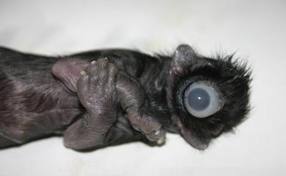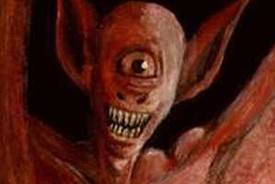
|
|||
The POPOBAWA - A ZANZIBARI INCUBUS - Weird Creature You Don't Want to Meet
Source : http://en.wikipedia.org/wiki/Popobawa
Fear has struck residents of the Zanzibar Islands after rumours of the re-emergence of a sexually voracious ghost that attacks people while they sleep in their beds at night. Many Zanzibaris are now refusing to sleep in their houses as they believe it only preys on people in the comfort of their own beds. The ghost or genie goes by the name of Popo Bawa and people believe that it sodomises its victims, most of whom are men. In recent years the residents on the semi-autonomous Tanzanian islands claimed that Popo Bawa only visited the islanders during voting, such as in the contentious general elections in 1995 and 2000. But to the surprise of many this current ghost has reappeared when there is no polling of any kind. Popobawa, also Popo Bawa, is the name of an evil spirit, or shetani, which is believed by residents to have first appeared on the Tanzanian island of Pemba. In 1995, it was the focus of a major outbreak of mass hysteria or panic which spread from Pemba to Unguja, the main island of the Zanzibar archipelago, and across to Dar es Salaam and other urban centres on the East African coast. Popobawa is a Swahili name which translates literally as "bat-wing" (from Swahili popo, "bat", and bawa, "wing"). This name is said to have originated as a description of the dark shadow cast by the spirit when it attacks at night: it does not refer to the actual form of the spirit, which is liable to change. Swahili speakers also use a plural form of the name - mapopobawa - to refer to multiple manifestations of the feared spirit. This plural is anglicized as "Popobawas" Popobawa is a shapeshifter and described as taking different forms, not just that of a bat as its name implies. It can take either human or animal form, and metamorphose from one into the other. Popobawa typically visits homesteads at night, but can also be seen in the daytime. It is sometimes associated with the presence of a sulfurous odor, but this is not always the case. Popobawa attacks men, women and children, and may attack all of the members of a household, before passing on to another house in the neighbourhood. Its nocturnal attacks can comprise simple physical assault and/or poltergeist-like phenomena; but most feared is sexual assault and the sodomising of adult men and women. Victims are often urged to tell others that they have been assaulted, and are threatened with repeat visits by Popobawa if they do not. During Popobawa panics many people try to guard against attack by spending the night awake outside of their houses, often huddled around an open fire with other family members and neighbours. Panics occur most often in Zanzibar, throughout the island of Pemba and in the north and west of Unguja (Zanzibar) island, including Zanzibar town. Episodes have also been reported in Dar es Salaam and other towns on the mainland coast of Tanzania As legendary creatures go, Popobawa is of fairly recent origin. Sightings of the popobawa only go back about forty years; Parkin states that the first reports date back to 1965 on the island of Pemba, appearing shortly after that island’s political revolution. Better-known sightings followed in 1970, and the creature resurfaced periodically in the 1980s, reaching a peak in 1995. Five years passed without a sighting, but the popobawa appeared briefly in 2000 and again in 2007. A popular origin story of Popobawa proposes that in the 1970s an angry sheikh released a djinni to take vengeance on his neighbors. The sheik lost control of the djinni, who took to demonic ways. It has been argued that because of Zanzibar's past as an Arab-run slave market, the story of Popobawa is an articulated social memory of the horrors of slavery (Parkin 2004). Many of the legends on Zanzibar came from the colonizers and traders of the past, including Arabs, Portuguese, Hindus, Chinese, Britons, Persians and Africans. TV Personality Benjamin Radford, who investigated the Popobawa in 2007, reported in the Fortean Times that the legend has its roots in Islam, the dominant religion in the area. According to Radford, “holding or reciting the Koran is said to keep the Popobawa at bay, much as the Bible is said to dispel Christian demons.”
The infamous Popobawa has struck again causing panic in the Zanzibar islands off the coast of Tanzania in Africa. The "creature", described as a cyclops dwarf with bat-like wings and ears, and sharp talons, is feared for its nasty habit of sodomizing men while they sleep in their beds. The presence of the often invisible Popobawa can be detected by an acrid smell or a puff of smoke. Sometimes, the Popobawa is visible to everyone except the terrified victim. It is believed to take human form by day, but with pointed fingers. After doing its vile deed, the Popobawa instructs its victims to spread the word about their ordeal or it would be back. The Popobawa, its name derived from the Swahili words for "bat" and "wing", first appeared in the neighboring island of Pemba in 1972. More attacks were reported in the 1980s, again in April of 1995, and recently in 2000 and July 2001. Attacks appear to coincide with political stress such as election. The 1972 attacks followed the assassination of the country’s president. Interestingly, the recent attacks have come without any political turmoil. Hospitals in Zanzibar have treated numerous broken ribs, bruises, and other injuries attributed to the Popobawa. One mentally ill man was hacked to death after confessing that he was the troublesome demon. During times when the Popobawa terrorizes the islands, whole families will often sleep arm-in-arm in front of their houses, seeking safety in numbers.  Mjaka Hamad, a peasant farmer in his mid-50s and a victim of the Popobawa’s attacks in 1995, has related his ordeal to the media. "I could feel it," Hamad said. "...something pressing on me. I couldn’t imagine what sort of thing was happening to me. You feel as if you are screaming with no voice. It was just like a dream but then I was thinking it was this Popobawa and he had come to do something terrible to me, something sexual. It is worse than what he does to women." Hamad claimed that he did not believe in the Popobawa or other spirits before the attack and suggests that is the reason he was attacked. "I don’t believe in spirits so maybe that’s why it attacked me. Maybe it will attack anybody who doesn’t believe." The Popobawa appears to be an African version of the wide-spread Mara phenomenon. Joe Nickell, an investigator with CSICOP (Committee for the Scientific Investigation of Claims of the Paranormal), has compared the Popobawa to Medieval legends of succubi (female spirits) and incubi (male spirits) who sexually molested their victims in bed at night. In Newfoundland, an ugly old woman sexually molested men in a phenomenon known as Hagging. Other similar reports from around the world describe vampires, formless black blobs, and extraterrestrials among other bizarre entities. Skeptics claim that these experiences are a result of a hypnogogic hallucination during a "waking dream". Paralysis, a sense of being weighted down, floating sensations, and encounters with otherworldly beings are often all unifying characteristics of the phenomenon. Submit News/Videos/Links | Discuss article | Article Link | More Unsolved and Unexplained Mysteries |
More can be addded on request. Direct your requests at vinit@theunexplainedmysteries.com
